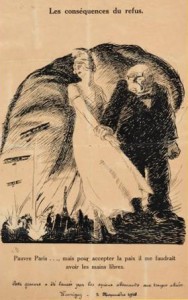Clemenceau holds firmly the arm of a woman wearing the Phrygian cap, allegory of France to move away from Paris bombed by enemy planes © Paris, musée Clemenceau.
 The Prince Sixte Bourbon-Parma in Belgian uniform and decorated with the French Croix de Guerre © Paris, musée de l’Armée
The Prince Sixte Bourbon-Parma in Belgian uniform and decorated with the French Croix de Guerre © Paris, musée de l’Armée
Attempts to find peace
1917
Preferring the threat of war, Bethmann Hollweg unleashed all-out submarine warfare on 1 February 1917. On 3 February, Wilson broke off all diplomatic contact with Germany. On 6 April 1917, the United States went to war alongside the Allies. On 17 July 1917, the Reichstag proclaimed the Friedensresolution, a peace resolution tabled by members Mr Erzberger, Mr David, Mr Ebert and Mr Scheidemann, which demanded conciliatory peace in order to put an end to the war. It was accepted by 216 votes to 126.
1918
In April 1918, the “Sixte” affair broke out put an end to Charles I’s attempts at peace. In April 1918, Ottokar Czernin (1872-1932), the Austro-Hungarian Foreign Minister, who sought to slow down his sovereign’s negotiations and still believes in an Austro-German military victory, delivered a speech to the Vienna Municipal Council. He accused France of having prevented peace negotiations due to the burning question of Alsace-Lorraine. Georges Clemenceau, President of the Council and French Minister of War, published Emperor Charles I’s secret letter of 24 March 1917, which contradicted Czernin’s words. Charles I was forced to abandon the concessions made to France on Alsace-Lorraine and Belgium. Despite the worrying situation caused by the major German offensives of March 1918, Clemenceau ended the negotiations. US Foreign Minister Robert Lansing blamed Clemenceau for the failure of the negotiations: “If Clemenceau was aiming to prove that Czernin was lying, he may have succeeded, but at what price! His revelation has thrown Austria into Germany’s arms”.



Ajouter un commentaire